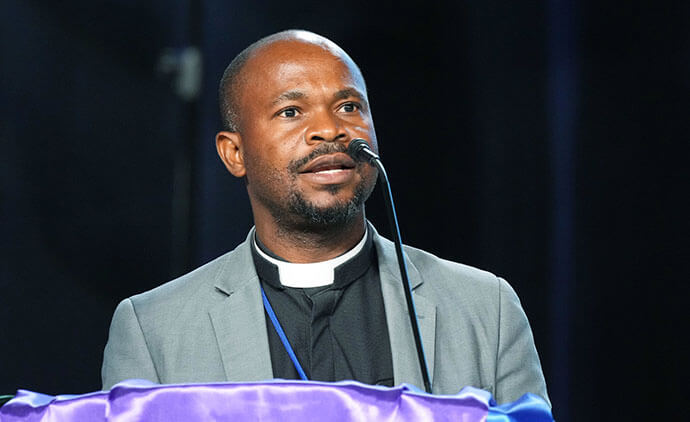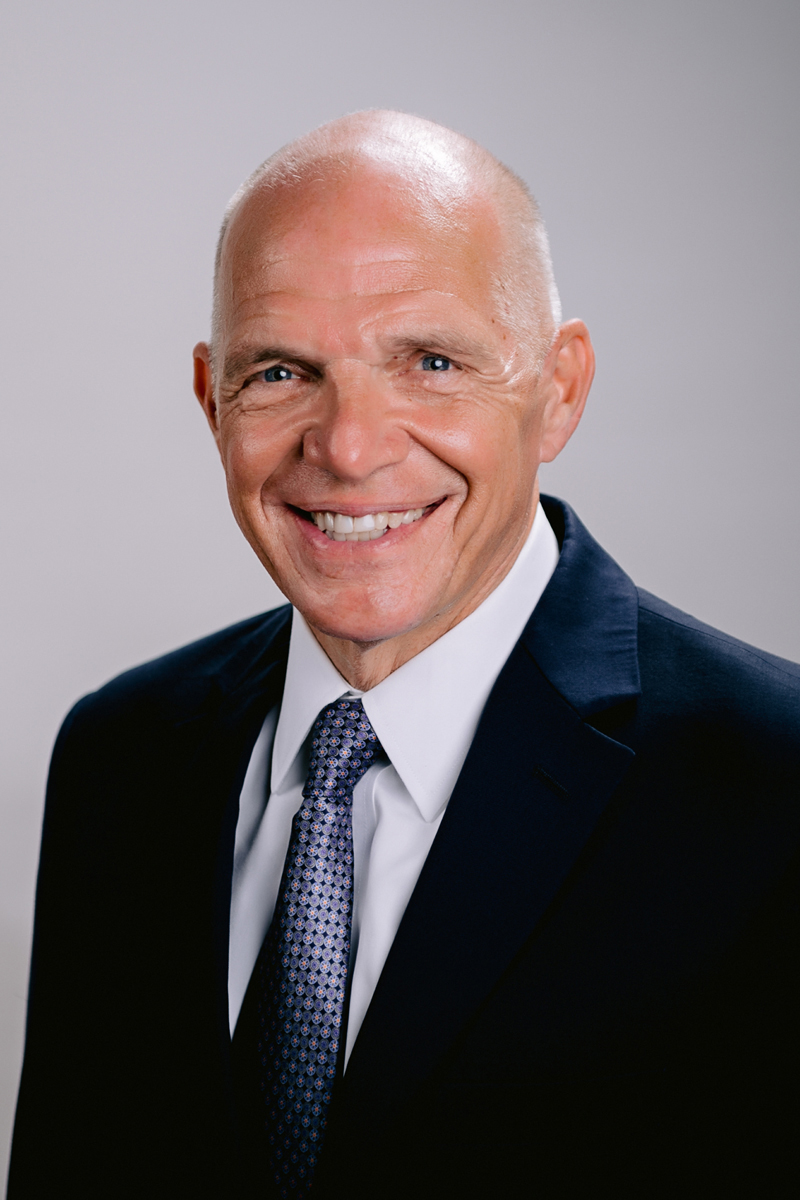Key points:
- Bishop John Wesley Yohanna announced on July 29 that he and his cabinet are leaving The United Methodist Church, ending speculation and years of infighting.
- The denomination’s Council of Bishops is designating interim leadership to guide the church in Nigeria until episcopal elections are held in December.
- The Rev. Ande I. Emmanuel, who leads a group staying in The United Methodist Church of Nigeria, said Yohanna’s faction comprises a small number of members.
Bishop John Wesley Yohanna and his cabinet have left The United Methodist Church of Nigeria, and the denomination’s bishops are appointing interim leadership until episcopal elections later this year.
Yohanna announced in a July 29 press briefing that he is leaving and joining the Global Methodist Church, a breakaway denomination launched in 2022 by former United Methodists wanting a more conservative church. He submitted his resignation to the United Methodist Council of Bishops the same day.
Bishop Tracy S. Malone, council president, and other council leaders are working with the West Africa College of Bishops and Episcopacy Committee to identify interim leadership for the church in Nigeria, according to a council press release July 30.
In a letter to fellow bishops, Malone requested prayer for Yohanna and the church in Nigeria.
“We are saddened by his decision to no longer continue ministry with The United Methodist Church,” she wrote. “I invite us to pray for our former colleague and the church in Nigeria, especially those who choose to remain in The United Methodist Church. This is a very difficult and confusing time for them.”
Malone also is requesting that general secretaries and bishops with covenantal relationships in Nigeria withhold sending funds, or place them in escrow, “until new episcopal leadership … and new mechanisms are in place,” the press release said.
Yohanna was scheduled to retire as bishop at the end of this year. The West Africa Central Conference will elect three new bishops in December, and one will be appointed to Nigeria.
Yohanna’s departure ends months of speculation and is the culmination of at least three years of bitter infighting over leadership in The United Methodist Church in Nigeria, which included complaints filed with the council regarding the bishop’s leadership. It also thwarts years of reconciliation talks and pacts involving the West Africa Central Conference College of Bishops and the denomination’s Council of Bishops to restore peace to the church in Nigeria, where conflicts had escalated to unhealthy levels, resulting in the arrest of pastors and a lay member on instruction from the bishop’s office.
Subscribe to our
e-newsletter
A group of United Methodists from the North East and Southern Nigeria conferences, meeting July 24 at McBride United Methodist Church in Jalingo, decided to leave the church. They cited the recent decision by The United Methodist Church’s top lawmaking assembly, General Conference, to change the definition of marriage in the Social Principles, remove anti-LGBTQ language from the Book of Discipline and allow the ordinationof “self-avowed practicing gay clergy.” Those members said the General Conference action was incompatible with biblical teachings.
Announcing the decision, Yohanna said: “The cabinet of the Southern Nigeria annual conference in conjunction with the North East therefore reject (developments in the UMC) and we adhere to the biblical teachings and we are going to follow the body of Jesus Christ. I stand by the decision of cabinet and that is what I will abide by.”
The Nigeria Episcopal Area comprises those two conferences along with the Central and Northern Nigeria conferences.
The denomination’s Book of Discipline lays out specific rules for how decisions are made affecting individual annual conferences. Conferences must meet individually, and the people voting must be duly elected representatives.
In his press briefing, Yohanna addressed the Nigerian president and other government and Taraba state officials, as well the media, confirming that he and his followers have exited the denomination for the new church. Yohanna had previously declared on June 1 to UM News and other Nigerian public and church media that he was a bishop of The United Methodist Church.
After his announcement about leaving the denomination, signage for the Global Methodist Church was erected at some churches and the episcopal offices at Mile Six, Jalingo, which is home to the church head offices, hospital and orphanage. The late bishops Done P. Dabale and Kefas K. Mavula are also buried on the campus.

The United Methodist Church in Nigeria has been torn by conflict between factions led by Yohanna and his former assistant, the Rev. Ande I. Emmanuel, who has vowed to stay in The United Methodist Church. Emmanuel had filed a lawsuit against Yohanna and the Nigeria Episcopal Area’s board of trustees, stating that the episcopal leader planned to leave the denomination and take church properties with him.
A third group, calling itself the Southern Conference of The United Methodist Church, separated from the episcopal area about 11 years ago, refusing to accept Yohanna’s authority, and it has continued to use The United Methodist Church name and emblem.
The conflict between the bishop and his former aide stemmed from differences over the future of the church. Emmanuel filed a complaint with the denomination’s bishops against Yohanna, and he blamed Yohanna for punishing him and others committed to staying in The United Methodist Church by having them arrested. Yohanna had repeatedly said he would join the new denomination and that the episcopal area — with church properties — would go with him if General Conference allowed same-sex marriage and ordination of “self-avowed practicing” gay clergy.
In 2022, members of the West Africa College of Bishops and the Council of Bishops mediated a just resolution agreement between Yohanna and Emmanuel. The conflict continued, however, and another agreement, the Nigeria Path Forward Covenant, was reached in March this year. That agreement was drafted with input from the West Africa college and the Council of Bishops, represented by Bishop John Schol, who leads the Eastern Pennsylvania and Greater New Jersey conferences, Bishop Patrick Streiff of the Central and Southern Europe Central Conference, and retired Bishop David Yemba of the Congo Central Conference. Both Yohanna and Emmanuel had input and agreed to the covenant.

Greater New Jersey Area Bishop John R. Schol
Photo by Shari deAngelo, the Greater New Jersey Conference.
The Path Forward sought to restore peace in the church and grow United Methodist witness in Nigeria. The plan called for withdrawing the legal actions that each side had filed against the other. As a result, Emmanuel’s group applied to the court to withdraw the property case and the judge granted the application but directed the group to pay for the church’s court cost of 300,000 naira or about US$180.67. Two weeks later, when Yohanna announced he was leaving the church, he also had the property.
While Yohanna and Emmanuel both claim to have the majority of church members in their faction, the exact following of each leader is not known. Membership in Nigeria was recorded at about 602,000, according to 2023 information on file with the General Council on Finance and Administration. According to the agency, the Southern Nigeria Conference, where Emmanuel is based, is home to 296,500 members, almost half of the United Methodists in the episcopal area.
Commenting on Yohanna’s departure, Emmanuel stated it was not the entire episcopal area that had left The United Methodist Church but a small number of people. “It is only a breakaway faction (10%) led by Bishop John Wesley Yohanna that has decided to leave. The majority of the UMC Nigeria episcopal area remains committed to The United Methodist Church.”
For three years since his removal from the position of bishop’s assistant, Emmanuel has led a parallel group with its own leadership and programs. While Yohanna was announcing the decision to leave at McBride United Methodist Church, Emmanuel and his leaders and annual conference members — called delegates in Nigeria — gathered at a different venue in the same town.
Asked about what would happen to the United Methodist Church properties, which include sanctuaries, guest houses, schools, hospitals and orphanages, Emmanuel said the question was a no-brainer. “The property stays with the United Methodists because in Nigeria we follow the Book of Discipline and the trust clause, and because most Nigerians are staying with The United Methodist Church.” The denomination’s trust clause states that all church properties are held in trust on behalf of the entire United Methodist Church.
In a statement to United Methodists in Nigeria, Emmanuel and others said they were saddened by the manner in which Yohanna exited the church.
“Despite the presence of a structured process and opportunities to work together with the United Methodist delegates in Nigeria, he chose to bypass these avenues,” the group stated. “This has created a situation which could have been handled with greater unity and consideration for our collective future.”
The Nigerian government last week closed some churches in the state of Gombe amid rising tensions. The United Methodist group assured members the closures were temporary and they had communicated with the Council of Bishops requesting an interim bishop for Nigeria.
Schol was in Nigeria July 20-23 to listen to the concerns and help mediate the crisis.
“You are important to the future of the church. I am here to listen to you, to understand you and to help the Nigerian church move forward,” he told church leaders on July 22, drawing thunderous applause. “I know there have been deep divisions in the church and that you want the church to be whole, you want the church to come together, you want the church to work together to proclaim Jesus Christ, and that’s what we have to begin to work on.”
However, the day after Schol’s departure, Yohanna’s followers in the North East and Southern conferences decided to leave The United Methodist Church.
The Book of Discipline’s Paragraph 572 outlines a multistep process for conferences outside the United States to become autonomous. For the Nigeria conferences, those steps would include formal votes by the annual conferences as well as approval by the West Africa Central Conference, Standing Committee on Central Conference Matters and General Conference. Under the procedure outlined in Paragraph 572, the Nigerian conferences could not officially leave until late 2028 at the earliest. The provision also does not deal with transferring to another denomination such as the Global Methodist Church.
Four Eurasian annual conferences — encompassing congregations in Russia, Belarus, Kyrgyzstan and Kazakhstan — followed the Paragraph 572 process and got approval at the recent General Conference to leave and form the autonomous Christian Methodist Church. Eurasia’s departure will become official in April next year.
The Council of Bishops reports that the Côte d’Ivoire Conference, which voted to leave in May, is following Paragraph 572’s process to once again become an autonomous church.
The United Methodist Church has seen United Methodist conferences leave without following church law. In 2022, the Bulgarian part of the Bulgaria-Romania Provisional Annual Conference voted to leave and join the Global Methodist Church. The Romanians are staying United Methodist and planning a new future with the Hungary Annual Conference.
Chikwanah is a United Methodist News correspondent based in Harare, Zimbabwe.
News media contact: Julie Dwyer at (615) 742-5470 or newsdesk@umnews.org. To read more United Methodist news, subscribe to the free Daily or Weekly Digests.




